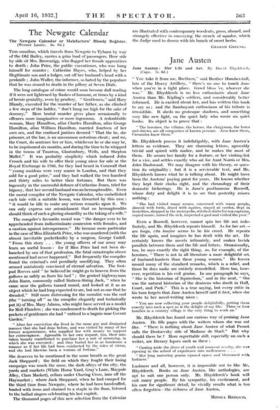Jane Austen Jane Austen : Her Life and Art. By
David Rhydilenti: (Cape. 7s. &I.) Jane Austen : Her Life and Art. By David Rhydilenti: (Cape. 7s. &I.)
"You take it from me, Brethren," said Brother Ifumberstall, late of the Heavy Artillery, "there's no one to touch Jane when you're in a tight place. Gated bless 'Cr, whoever she was." Mr. Rhydderch is no less enthusiastic about Jane Austen than Mr. Kipling's soldiers, and considerably better informed. He is excited about her, and has written this book to say so ; and the flamboyant enthusiasm of his tribute is irresistible. It sheds no grotesque shadows, and something very like new light, on the quiet lady who wrote six quiet books. Its object is to prove that :
" The heroines, the villains, the heroes, the clergymen, the bores and shrews, are all composites of known persons. Jane knew them, Cassandra knew them."
Mr. Rhydderch proves it indefatigably, with Jane Austen's letters as evidence. They are claiming letters, agreeably trivial and spiced with malice, and he makes the most of them. He scours her family for a feature, or her visiting-list for a vice, and settles exactly who sat for Aunt Norris or Mrs. John Dashwood. We may disagree with his theory, or ques- tion its originality ; but it is a serviceable text, and Mr. Rhydderch knows what he is talking about. He might have been the Austens' paying guest for years. Ile knows whether they kept their clocks right, and the chronology of their domestic bickerings. He is Jane's posthumous Boswell, whose duty and delight it is to see that posterity misses nothing :
" She had visited many scenes, conversed with many people. danced with lords, dined with squires, stayed at castles, slept in hostelries, shopped in the metropolis, stitched shirts for sea-captains, copied music, nursed the sick, inspected a gaol and visited the poor."
Even a Boswell, however, cannot spin her life out inde- finitely, and Mr. Rhydderch repeats himself. As for her art-- an longa, tile longior scents to be his creed. He repeats the life again, and imagines he has dealt with the art. He certainly knows the novels intimately, and makes lavish parallels between them and the life and letters. Occasionally, too, he says exactly the right thing, as, for example, of the heroines, "There is not in all literature a more delightful set of husband-hunters than these young women." He leaves unsaid many of the standard remarks, which is a relief, and those he does make are entirely remodelled. Here too, how- ever, repetition is his evil genius. In one paragraph he says, " She is the historian of Squiredom," and in the next, " She was the natural historian of the denizens who dwelt in Half, Court, and Park." This is a true saying, but every critic in his turn forgets that Jane Austen herself said it first, when she wrote to her novel-writing niece : "You are now collecting. your people delightfolly, getting them exactly into such a spot as Is the delight of my life. Three or four families in a country village is the very thing to work on."
Mr. Rhydderch has found one curious way of praising Jane Austen. lie fills pages with the writers whom she was nog like. "There is nothing about Jane Austen of what Proust calls the Dostoevsky side of Madame de Staid." But why should there be ? More regrettable still, especially on such a writer, are literary lapses such as these :
" Casting aside the dross of youth and innocent revelry, she was ripening in the school of experience into mellowness. . .
" Her long maturing genius ripened apace and blossomed with lushness."
Lushness and all, however, it is impossible not to like Mr. Rhydderch. Books on Jane Austen, like anthologies, are apt to suit one person only. Mr. Rhyddereh's book will suit many people. By his sympathy, his excitement, and his care for significant detail, he vividly recalls what is too often forgotten—the richness of Jane Austen.
MONICA REDLICH.








































 Previous page
Previous page